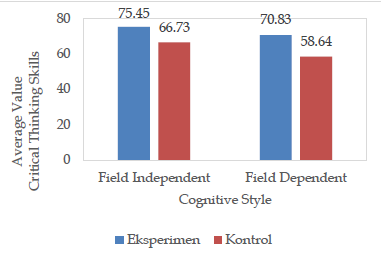The Influence of Cognitive Style on Students' Critical Thinking Skills in Physics Material
Abstract
This research aims to determine the influence of cognitive style on students' critical thinking abilities. This research uses a quasi-experimental method with a factorial design research design. The research subjects consisted of class XI MAN 1 Central Lombok students who were divided into experimental classes and control classes. The experimental class uses the PBL model, while the control class uses a conventional learning model. Research instruments include critical thinking ability tests and the Group Embedded Figures Test (GEFT) cognitive style test. Before the critical thinking ability test instrument is given, a test of the instrument is first carried out, namely a validity and reliability test. level of difficulty, and distinguishing power. The research results show that the significant level value is 0.001 which is smaller than α which is equal to 0.05 (0.000<0.05). These findings indicate that there is an influence of cognitive style on students' critical thinking abilities.
Full text article
References
Andriyani, R., & Saputra, N. N. (2020). Optimalisasi kemampuan higher order thinking skills mahasiswa semester awal melalui penggunaan bahan ajar berbasis berpikir kritis. Al-Khwarizmi: Jurnal Pendidikan Matematika dan Ilmu Pengetahuan Alam, 8(1). https://doi.org/10.24256/jpmipa.v8i1.948
Arifin, S., Setyosari, P., Sa’dijah, C., & Kuswandi, D. (2020). The effect of problem-based learning by cognitive style on critical thinking skills and student retention. Journal of Technology and Science Education, 10, 271-281. https://doi.org/10.3926/jotse.790
Arikunto, S. (2013). Prosedur Penelitian: Suatu Pendekatan Praktik. Jakarta: Rineka Cipta.
Aryawati, N. P. A., Pujani, N. M., & Widyanti, N. L. (2020). Pengaruh model problem-based learning terhadap keterampilan berpikir kritis dalam pembelajaran biologi ditinjau dari gaya kognitif siswa kelas X SMA. Jurnal Matematika, Sains, dan Pembelajarannya, 14(2), 105-124. https://doi.org/10.23887/wms.v14i2.24141
Ennis, R. H. (2011). The nature of critical thinking: An outline of critical thinking dispositions and abilities. Presentation at the Sixth International Conference on Thinking at MIT, Cambridge, MA, July, 1994. Faculty of Education, Illinois. Retrieved from https://education.illinois.edu/docs/default-source/faculty-documents/robert-ennis/thenatureofcriticalthinking_51711_000.pdf
Facione, P. A. (2010). Critical Thinking: What It Is and Why It Counts. USA: Insight Assessment. Retrieved from https://www.law.uh.edu/blakely/advocacy-survey/Critical%20Thinking%20Skills.pdf
Hardiyanto, H., Failasofah, F., Armiwati, A., Abrar, M., & Thabran, Y. (2021). Students' practices of 21st-century skills between conventional learning and blended learning. Journal of University Teaching and Learning Practice, 18(3). https://doi.org/10.53761/1.18.3.7
Junaidi, J., Roza, Y., & Maimunah, M. (2020). Kemampuan berpikir siswa dalam menyelesaikan soal HOTS pada materi pola dan barisan bilangan. E-Saintika: Jurnal Penelitian dan Pengkajian Ilmu Pendidikan, 4(2), 173. https://doi.org/10.36312/e-saintika.v4i2.220
Lefrida, R., Siswono, T. Y. E., & Lukito, A. (2021). Process-oriented routines of students in heterogeneous field dependent-independent groups: A commognitive perspective on solving derivative tasks. European Journal of Educational Research, 10(4), 2017-2032. https://doi.org/10.12973/eu-jer.10.4.2017
Malanog, S., & Aliazas, J. (2021). Active learning strategies and higher-order thinking skills of grade 10 students. International Multidisciplinary Research Journal, 3(3), 241-249. https://doi.org/10.54476/iimrj255
Marwan, M., Khaeruddin, K., & Amin, B. D. (2020). Pengembangan instrumen asesmen higher order thinking skills (HOTS) pada bidang studi fisika. Prosiding Seminar Nasional Fisika PPs UNM, 02, 116–119. Retrieved from https://ojs.unm.ac.id/semnasfisika/article/view/14365
Men, F. E. (2017). Proses Berpikir Kritis Siswa SMA dalam Pengajuan Soal Matematika Berdasarkan Tingkat Kemampuan Matematika. Jurnal Matematika Kreatif Inovatif, 8(2), 192-198.
https://doi.org/10.36928/jpkm.v9i1.115
Oktaviani, L., Dantes, N., & Sadia, W. (2014). Pengaruh model problem-based learning berbasis asesmen kinerja terhadap hasil belajar IPA ditinjau dari gaya kognitif. Jurnal Ilmiah Pendidikan dan Pembelajaran Ganesha, 4(1), 1-11. Retrieved from https://ejournal-pasca.undiksha.ac.id/index.php/jurnal_ep/article/view/1117
Pepo, A. R. R., Arjaya, I. B. A., & Paraniti, A. A. I. (2019). Penerapan model pembelajaran problem-based learning berbasis Google Classroom terhadap kemampuan berpikir kritis ditinjau dari gaya kognitif siswa. Jurnal Biologi Kontekstual, 1(2), 152-163. Retrieved from https://e-journal.unmas.ac.id/index.php/JBK/article/view/628
Persky, A., Medina, M., & Castleberry, A. (2019). Developing critical thinking skills in pharmacy students. American Journal of Pharmaceutical Education, 83. https://doi.org/10.5688/AJPE7033
Pritchard, A. (2009). Ways of Learning: Learning Theories and Learning Styles in the Classroom. New York: Routledge Taylor & Francis Group.
Rusnilawarni, R. (2017). Pengaruh Model Pembelajaran dan Gaya Belajar Terhadap Kemampuan Berpikir Kritis Peserta Didik Kelas X SMK Negeri 2 Watampone. Chemistry Education Review (CER), 1(1), 45-53.
https://doi.org/10.26858/cer.v0i0.3878
Sarwanto, S., Fajari, L., & Chumdari, C. (2021). Critical thinking skills and their impacts on elementary school students. Malaysian Journal of Learning and Instruction, 18(2), 161-188. https://doi.org/10.32890/mjli2021.18.2.6
Satwika, Laksmiwati, & Khoirunnisa. (2018). Penerapan Model Problem Based Learning Untuk Meningkatkan Kemampuan Berfikir Kritis Mahasiswa. Jurnal Pendidikan, 3(1), 7-12
https://doi.org/10.26740/jp.v3n1.p7-12
Son, A., Darhim, D., & Fatimah, S. (2020). Students’ mathematical problem-solving ability based on teaching models intervention and cognitive style. Journal on Mathematics Education, 11(2). https://doi.org/10.22342/jme.11.2.10744.209-222
Sundayana, R. (2016). Statistika Penelitian Pendidikan. Bandung: Alfabeta.
Susilawati, E., Agustinasari, A., Samsudin, A., & Siahaan, P. (2020). Analisis Tingkat Keterampilan Berpikir Kritis Siswa SMA. Jurnal Pendidikan Fisika dan Teknologi, 6(1), 11-16.
https://doi.org/10.29303/jpft.v6i1.1453
Tanjung, Y., Irfandi, I., Sudarma, T., Lufri, L., Asrizal, A., & Hardeli, H. (2023). The effect of constructivism learning on student learning outcomes: A meta-analysis study. ISER (Indonesian Science Education Research), 28-36. https://doi.org/10.24114/iser.v5i1.49409
Wijaya, A. P. (2020). Gaya kognitif field dependent dan tingkat pemahaman konsep matematis antara pembelajaran langsung dan STAD. Jurnal Derivat: Jurnal Matematika dan Pendidikan Matematika, 3(2), 1-16. Retrieved from https://journal.upy.ac.id/index.php/derivat/article/view/713
Witkin, H. A., & Goodenough, D. R. (1977). Field-dependent and field-independent cognitive styles and their educational implications. Review of Educational Research, 47(1), 1-64. Retrieved from https://psycnet.apa.org/record/1979-06062-001
Authors
Copyright (c) 2024 Nisa Hidayatullah, I Wayan Gunada, Susilawati, Muhammad Zuhdi

This work is licensed under a Creative Commons Attribution 4.0 International License.

